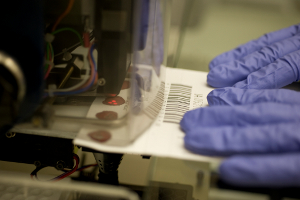Description of Disorders
A metabolic disorder is a condition caused by the accumulation or lack of certain chemicals or hormones made naturally in the body. With early diagnosis and medical treatment, complications from these serious, but uncommon, conditions can usually be prevented.
Amino Acid Disorders
Babies born with one of these disorders cannot metabolize or process amino acids properly. The result is an amino acid and protein imbalance and buildup in the body. Early treatment helps prevent brain damage, developmental delays, coma, seizures, autistic-like disorders and even death. Treatment depends on the specific amino acid disorder, but it may include a special diet, close monitoring and/or vitamin and amino acid supplements.
Biotinidase Deficiency
Babies born with biotinidase deficiency lack an enzyme that normally allows the body to reuse the vitamin biotin. Biotin helps maintain normal body function. Symptoms of biotinidase deficiency include seizures, low muscle tone, developmental delay, hearing loss and recurrent infections. Early diagnosis and treatment with biotin supplementation can result in normal growth and development.
Congenital Adrenal Hyperplasia
Congenital Adrenal Hyperplasia (CAH) occurs when an enzyme (21-Hydroxylase) deficiency prevents the body from making a stress hormone (cortisol) and, in some cases, a salt-retaining hormone (aldosterone). The production of a male hormone (androgen) may also be increased. Babies may develop vomiting and severe dehydration, which can be life-threatening. Treating with hydrocortisone can prevent these complications.
Cystic Fibrosis
Cystic fibrosis is an inherited chronic disease that affects the lungs and digestive system of about 30,000 children and adults in the United States (70,000 worldwide). A defective gene and its protein product cause the body to produce unusually thick, sticky mucus that clogs the lungs leading to life-threatening lung infections; and obstructs the pancreas stopping natural enzymes from helping the body break down and absorb food.
Cystic fibrosis is the most common fatal genetic disease of Caucasians. It also occurs in other ethnic groups with lesser frequency. A recessive trait, the gene frequency in those of Northern European descent is estimated to be as high as 5% of the population. There are no adverse effects for carriers of a CF mutation; the potential for disease only occurs when a CF mutation is inherited from both parents. Although a specific cure is still wanting, aggressive treatment at specialized Cystic Fibrosis Centers has increased the average survival from less than 10 years when the disease was first identified over 40 years ago, to 16 years only about 30 years ago, to its current mean of the mid-thirties. Quality of life has similarly progressed during this period.
Fatty Acid Oxidation Disorders
Babies born with fatty acid oxidation disorders are unable to break down stored fats into energy. Energy from fat keeps the body running whenever it runs out of its main source: glucose. Prolonged fasting (i.e., going for long periods without eating, such as during an illness) can lead to severe, life-threatening symptoms or even death. Treatment includes dietary management and avoiding long periods without eating.
Galactosemia
Babies with this disorder cannot convert galactose, a sugar present in milk, into glucose, a sugar that the body uses as an energy source. Galactosemia can cause death in infancy, or blindness and developmental delays. The treatment for this condition is to eliminate milk and all other dairy products from your baby’s diet.
Hemoglobinopathies
Sickle Cell Anemia and other Hemoglobin Disorders - Hemoglobin carries oxygen from the lungs to the rest of the body. Because hemoglobin disorders affect the amount of hemoglobin a person has, some hemoglobin disorders can cause anemia. Sickle cell anemia causes sickle-shaped red blood cells. These cells clog small vessels and capillaries so not enough oxygen can be carried to the body. Good medical care, parent education, and antibiotics can minimize life-threatening complications and prevent serious infections in childhood. Sickle cell anemia occurs in about one in every 375 African Americans. It is also commonly found in people from the area surrounding the Mediterranean Sea. Other hemoglobin disorders that may cause anemia (such as E, C, and D) can be found in other races.
Hypothyroidism
This disorder occurs when a baby is born without enough thyroid hormone. This can lead to poor growth and developmental delays. Early diagnosis and treatment with thyroid hormone usually results in normal growth and development.
Organic Acid Disorders
Babies born with an organic acid disorder have a chemical imbalance in their body that can be toxic. Organic acids play an important role in the breakdown of fats, sugars and protein for the body's use and storage. Muscle wasting, seizures, development delays and even death can occur if untreated. Treatment may include special diet, monitoring and medications.



